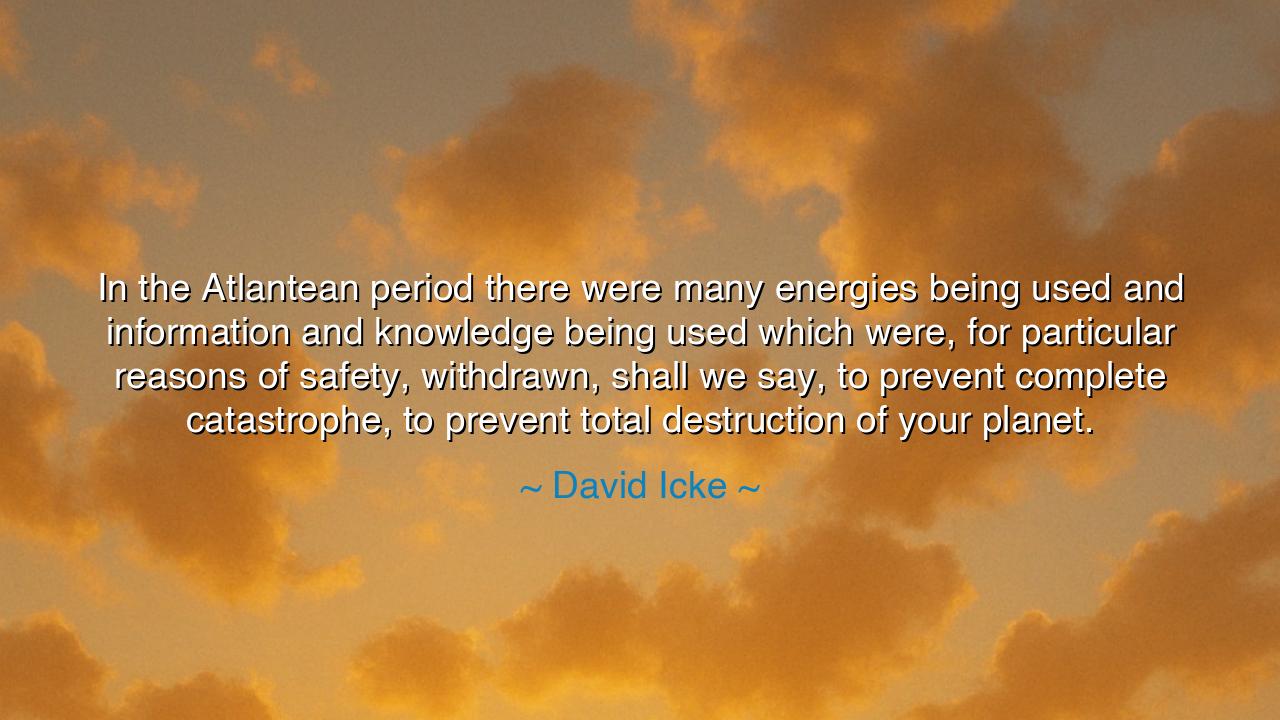
In the Atlantean period there were many energies being used and
In the Atlantean period there were many energies being used and information and knowledge being used which were, for particular reasons of safety, withdrawn, shall we say, to prevent complete catastrophe, to prevent total destruction of your planet.






“In the Atlantean period there were many energies being used and information and knowledge being used which were, for particular reasons of safety, withdrawn, shall we say, to prevent complete catastrophe, to prevent total destruction of your planet.” Thus spoke David Icke, a man whose visions straddle the line between myth and mystery, invoking the ancient legend of Atlantis — that lost civilization said to have possessed vast knowledge and unmatched power. Whether one takes his words as history, metaphor, or prophecy, they echo a truth older than time itself: that knowledge without wisdom can destroy, and that when humanity rises too swiftly without tempering its reach with humility, it courts its own downfall.
In this statement, Icke evokes the Atlantean age, a realm half shrouded in myth, half remembered in the deep dreaming of the human soul. The ancients spoke of Atlantis as a city of light and brilliance, where humankind mastered the forces of the earth and the heavens. Yet, their power, unguarded by restraint, led to arrogance — and from arrogance came ruin. The story of Atlantis, whether literal or symbolic, stands as one of the oldest parables of hubris, reminding us that when the flame of intellect burns without the vessel of virtue, it consumes rather than illuminates. Thus, when Icke speaks of energies withdrawn for safety, he tells of a cosmic mercy — that the higher forces, seeing mankind unready, veiled certain truths to spare the world from catastrophe.
It is said that in every epoch, humanity is tested with the measure of knowledge it can bear. The Atlanteans, in Icke’s telling, were granted mastery over energies far beyond our present science — powers of thought, vibration, and consciousness itself. But their fall was not of technology alone; it was a fall of spirit. They forgot the harmony between the material and the divine. They sought dominion, not balance; control, not communion. And when their own creations turned against them, the oceans rose, and their cities sank beneath the waves. The withdrawal of knowledge, then, was not punishment — it was protection, a divine act of preservation that allowed the seed of humanity to survive and grow anew.
History, too, bears this pattern. When the great Library of Alexandria burned, the world lost centuries of wisdom — yet some have said it was a necessary rebirth. The knowledge once hoarded by a few was destined to return, purified, to the many. When mankind rediscovered the power of the atom, it brought both light and shadow: the promise of endless energy and the horror of annihilation. Once more, as in Atlantis, humanity stood at the crossroads — to wield power wisely or perish by its misuse. The same truth endures: knowledge itself is neither good nor evil; it becomes what the heart of man makes it.
Icke’s words, though wrapped in esoteric imagery, call us to responsibility. He reminds us that there are truths and forces in the universe too immense to be held by a reckless mind. The energies withdrawn — whether they be literal technologies, spiritual capacities, or higher dimensions of consciousness — remain hidden until we are ready to wield them with reverence. It is not the universe that withholds them; it is our own immaturity that bars the way. When we learn again to unite intellect with empathy, reason with reverence, then the gates of that lost knowledge will open once more. The Atlantean legacy still sleeps within the human spirit, awaiting the day we can awaken it without destroying ourselves.
Consider this: every generation believes itself more advanced than the last, yet progress without wisdom is merely acceleration toward ruin. The ancients built monuments of stone; we build monuments of code and steel. But have we built within ourselves the moral foundations to sustain the power we possess? That is the question Icke’s words whisper across the centuries. The warning of Atlantis is not ancient — it is eternal. It tells us that the heart must evolve with the mind, or the mind will consume the world.
Therefore, my listener, take this teaching as a mirror for your own age: seek knowledge, but seek balance first. The pursuit of truth must walk hand in hand with humility, for every mystery revealed brings both creation and responsibility. Do not grasp for powers you do not yet understand; cultivate the strength of character to bear them when they come. Learn from the Atlanteans, who reached the heavens and fell into the sea. For every soul — like every civilization — holds the potential to rise or to sink. The difference lies not in what we know, but in how we use what we know.
And so, as Icke’s vision reminds us, the higher energies of existence are not gone — they are waiting, veiled in mercy, until mankind learns to wield them with love instead of pride. When that day comes, the hidden wisdom of the ancients will return, not to destroy, but to heal. Then, what was once lost beneath the waves of time will rise again, and the light of Atlantis — the union of knowledge and spirit — shall shine upon a wiser world.






AAdministratorAdministrator
Welcome, honored guests. Please leave a comment, we will respond soon